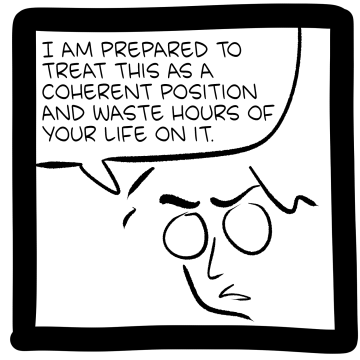Somehow, I can tolerate “jpheg” much easier than the forsaken “jif.”
Jif is where it’s at. Peanut butter and image format? Yes please
But Jif in Australia is a cleaning solution - can we have different pronunciations based on country?
No need, it’s Gif. Heathens be damned.
Y’all love diminutives, call them jiffies?
Jiffy is already an abstract measurement of time though
Fits perfectly.
Jiffy is the average length of a gif.Give me about four jiffies, I’ve just got to finish wiping my ass
Sounds more than fair. We can’t agree to a person on our sounds anyway.
No. You cannot.
The creators literally referenced this early on “choosy devs choose gif” like the jiff peanut butter commercial.
this goes deeper than I thought!
Yes, and that’s stupid.
It’s not ‘Jraphical Image Format’. Gah!!!
deleted by creator
/skəba/ (sk•uh•bah), obviously.
Oh my God no one fucking cares about Steve Wilhite and his fucking speech impediment.
You seem upset.
That’s a lot of peanut butter
You don’t pronounce the word for imagery as “jrafics?” How odd.

Giraffics
Stupid long horses
By that standard, the comic is right and we should say j-feg
Do you also pronounce origin like Oregon
“Jif” is the original pronunciation. It is a pun, a play on the word “jif” short for “jiffy” meaning a short amount of time, as in “I’ll send it to you in a gif”. The newer pronunciation has become popular based on the fallacious reasoning that an acronym should be pronounced the same as its constituent words, which isn’t a thing at all.
Language evolves, and both pronunciations are common enough to be considered acceptable. The only way to be wrong about how to pronounce the word is to claim one of the pronunciations is wrong.
Become popular? It’s been popular roughly for the lifespan of the format. It’s hardly language’s fault the developer wanted to make an unfunny reference to a since forgotten peanut butter slogan.
On the other hand linguistics indicate a hard g sound with the construction of the word, constituent words aside. Plenty of four letter words starting with the gi combo have a hard g, including but not limited to gift which you may notice is very similarly constructed.
Whatever else the English language may throw at us, people appreciate consistency because we can make some sense of the world. A hard g is the consistent, predictable, sensible choice for the limited availability of those virtues English offers.
There exists other words that start with gi but use the soft g, gin for example. But regardless, the pronunciation of one word is not determined by the pronunciation of other unrelated words.
But regardless, the pronunciation of one word is not determined by the pronunciation of other unrelated words.
In English? Yes. In other, more structured and sane languages? No.
Jift.
an unfunny reference to a since forgotten peanut butter slogan.
Yep. Jiffy is only used for peanut butter. Great point!
You can find plenty of places where the claim is that it’s a soft g because “choosey devs choose gif”.
Where jiffy is used is irrelevant in that case.
It’s been popular in use but casual everyday people weren’t always bringing them up in conversation.
English is not consistent, accept that. You can say gif but I’ll continue to call it gif.
English is not consistent, accept that.
This is the real answer. Both are correct and that’s that. It can be gif as in image, or gif as in graphic.
English is not consistent, accept that. You can say gif but I’ll continue to call it gif.
That doesn’t mean we have an ehxcuse to haje jt worse
I’ve been saying gif with a soft g for over twenty years. Telling me not to is what makes English worse. As far I’m concerned both pronunciations are valid.
Telling me not to is what makes English worse.
In your opinion. “Jiggawatt” is not a common English pronunciation outside of back to the future references at this point. People mostly settled on one over the other because it makes sense to pronounce a word a similar way to be more easily understood. It’s not always the case, sure, but I think you’ll find multiple pronunciations are the exception, not the rule. That’s why you can come up with a good handful of such words, but you’ll be using words with single pronunciations to talk about them.
Become popular? It’s been popular roughly for the lifespan of the format.
I’m gonna stop you there, because I’ve been using the format for about 30 years, and people only started using the new pronunciation in the last 10-15.
Everything you said about linguistics is entirely crap. English is not a proscriptive language. English linguistics doesn’t indicate anything at all. It is descriptive, and is anything but consistent. There are no rules about word construction or pronunciation. Words are pronounced the way they are understood, and if you are understood then you have pronounced them correctly.
You could argue that the original pronunciation is archaic, like “encyclopaedia,” but the problem there is that the word itself is like 35 years old, and there are people like me who have been using the word since there was only one acceptable pronunciation who aren’t likely to change.
people only started using the new pronunciation in the last 10-15.
As someone else pointed out already, this is untrue. While it may not have been popular in your circles, it definitely was in others. I’ve been saying it with a hard g as long as you have with a soft and I’m not the originator either.
English linguistics doesn’t indicate anything at all.
They absolutely do. That’s why you can sound out a word you’ve never seen before. You may not always be right when you do because they indicate, they don’t define.
There are no rules about word construction or pronunciation.
There are, there are just exceptions. For example, an e at the end of the word is silent. I’m certain you can give me a word where it’s not, but there are at least six in this paragraph alone where it is.
if you are understood then you have pronounced them correctly
In this logic if someone has been pronouncing a word all their life with a single pronunciation and travels to another location with a much different accent they can only now be pronouncing the word wrong.
If understanding is also the only metric then a hard g would still be preferable. Not only does a written g tend to make people lean to a hard g in my experience, but there’s more words that could be mistaken for a soft g pronunciation.
You could argue that the original pronunciation is archaic,
Could I not argue that the original pronunciation has fallen out of favor?
the word itself is like 35 years old
Is there a time requirement for pronunciations to become archaic?
since there was only one acceptable pronunciation
Which isn’t a time that existed, as we’ve established
who aren’t likely to change.
Given your stance on language this is absolutely a you problem. If the rest of us collectively decided to understand it as only with a hard g, you would not be understood and therefore be pronouncing it wrong by your own logic.
I’ve never had the problem of not being understood. And regardless of how long the time period was, there was a time when one guy spoke aloud the word when he invented it. You can use the new pronunciation if you like, but I use the original, as I have for 30+ years, and I will continue to do so because both are acceptable. If you don’t like it, that’s a you problem.
There are, there are just exceptions. For example, an e at the end of the word is silent. I’m certain you can give me a word where it’s not, but there are at least six in this paragraph alone where it is.
One of the most common words with a final “e” in that paragraph is “the” which not only has a final “e” sound, but has two different final “e” sounds depending on the context: “the end” uses a /ði/ pronunciation but “the word” uses a /ðə/ pronunciation. English is very stupid.
But, I agree with your assessment. English has rules, or at least patterns. “G” is most often hard, not soft, because “J” is available for the soft version, but there’s no alternative for the hard version. English tends to follow patterns, and “gift” has a hard g, and it (and words based on it) are the only ones that start with “gif”, so every “gif” word is hard. Because “t” (unlike “e”) can’t change the sounds before it, the pattern says that “gif” should have a hard “g”.
If it were “gir”, then there would be more debate. The word “giraffe” has a soft “g” but “girl” has a hard one, so the pattern is more muddy.
Also, people who coin words don’t get to decide how they’ll be pronounced. They can certainly try, but they’ll often lose. There are plenty of words in English borrowed from other languages that not only sound nothing like the original language, but that sound nothing like they’d sound if they were English words. For example, “lingerie”. It’s a French word, but the English pronunciation sounds nothing like a French word. In fact, if someone just sounded out the word as if it were an English word, they’d probably get much closer to the French pronunciation than the awful “lawn-je-ray” which is the current accepted English pronunciation (though, they’d probably assume a hard “g” sound).
In this case, it’s too bad that Steve Wilhite didn’t have a background in linguistics or he would have realized that people would see “gif” and assume a hard “g”. It was a losing fight from the start because he either didn’t understand the assumptions people would have when they saw those letters, or he thought that somehow he could successfully fight the tide all by himself.
It’s Gif and I don’t care what anyone says
I don’t care either. Now excuse me while I go gerk off.
Dijusting.
The approximately equal amount of upvotes and downvotes this comment received pretty much sums up the entire gif wars.
The newer pronunciation has become popular based on
The newer pronunciation has become popular based on their internalization of the obscure patterns of English pronunciation, informed by the most similar word: “gift” which uses a hard g. Everyone I know of started saying it with a hard g because that’s what made sense based on the spelling, long before hearing the weird thing about constituent words.
Nobody pronounced LASER as Lah-seer, which you’d have to do if you used “A as in Amplification” an “E as in Emission”.
OK but there are other similar words that start with gi like giraffe and gigolo, but really that’s not why I or anyone I knew in the 90s started using the soft g to say “gif.” We did so because we learned about the format, and said “Neat, what’s it called?” and they said “it’s called a gif” because that was the name of the format. We didn’t debate the pronunciation because it had been given a name, the same way you don’t ask a person you just met “Shouldn’t ‘Bob’ be pronounced with a long ‘o’ like the very similar name ‘Job’? I’m going to call you ‘Bobe’ because that makes more sense to me.” You’d have to be a massive douche to say that out loud to a person who had just introduced themselves.
If someone said it with the hard “g” we just nodded and went about our day because it doesn’t matter, we knew what they probably meant and they just hadn’t read the manual.
Pronunciations change over time, and that’s good. Language is a function of communication, and better communication is what enabled humans to transfer knowledge. If someone uses the soft g, you know the word they’re saying, and I know you’re probably not saying the word “gift” from context. We’re communicating either way, and we don’t have to pronounce every word the same.
Case in point, I don’t say “emission” with a long “e” sound, I say “ehmission” because it doesn’t matter that much.
The only way to be wrong is to claim that someone else is saying it wrong.
“Neat, what’s it called?” and they said “it’s called a gif”
Yeah, and then we all assumed it was pronounced “gif” not “jif” because the only other word with the letters “gif” was “gift” and that had a hard g. Later on, someone claimed it was supposed to be pronounced “jif”, but we all laughed at that idea and kept using the correct pronunciation.
We didn’t debate the pronunciation because it had been given a name
Neither did we, it was a hard g. There was no debate. Sure, some people claimed it was supposed to be a soft g, but we all laughed at that idea because it was ridiculous.
We didn’t debate the pronunciation because it had been given a name, the same way you don’t ask a person you just met “Shouldn’t ‘Bob’ be pronounced with a long ‘o’ like the very similar name ‘Job’?
I’m guessing you’re not multilingual then, because I am, and it’s extremely common to change how someone’s name is pronounced. People with the name “David” who are French are used to the French pronunciation of their name being “Dah-veed” but in English “Day-vid”. French people pronounce “Bob” as “Bub”. It’s good to allow people to slightly change how your name is pronounced because it flows better in their language. If they have to pause every time your name comes up to adapt how it’s said, it just makes things more difficult.
As for “gif”, if someone pronounced it as “jif”, we giggled a bit, but that’s it. It was only if someone was really insistent that it had to be a soft g that we really laughed. Some people tried to claim that the creator of the format had wanted a certain pronunciation, but we knew that didn’t matter.
Language is a function of communication, and better communication is what enabled humans to transfer knowledge
Exactly, and part of good communication is good pronunciation, because if you mispronounce things it makes it harder for people to understand you. If you insist on using a nonsensical pronunciation then you’re just trying to make it hard to communicate with you.
That is the most anti-linguistic take ever lmao. There is no such thing as an objectively correct pronunciation, both pronunciations of “gif” are valid in the context of most English conversations.
On another note, the guy who created it said it’s pronounced /dʒɪf/, so if any pronunciation is more “correct” it’s the one you hate. It’s not “some people tried to claim”, that’s what it actually is “correctly” pronounced like according to the only one that can come close to being considered an authority on what the correct pronunciation is.
Your comment being so pretentious and stuck-up about you not liking a pronunciation leads me to believe you’re making the whole “we” thing up, and instead of a group of people being dumbasses and laughing at a correct pronunciation, it was just one person (you) malding about it in their head. Because being the kind of person to actually laugh at something like that in real life, face to face, would be too embarrassing for anyone to actually go through with it. God even just reading your comment makes me feel like I’m looking at made-up Reddit stories again…
Also how people speaking other languages handle names doesn’t have anything to do with this, there’s a big difference between calling someone “wrong” for pronouncing a loanword differently than in the parent language because of the languages’ phonetics & phonotactics not aligning with each other, and insisting that everyone else is “wrong” because their completely linguistically valid, common pronunciation challenges your understanding of the language.
Oxford uses /dʒɪf/ as the primary pronunciation with /gif/ as the secondary in most of their resources (although a lot don’t specify a primary or secondary), Dictionary.com lists /dʒɪf/ as the primary pronunciation, some like Merriam-Webster list both equally, Cambridge less consistent but list both. Clearly the people who’s job is language disagree with you, even if you don’t want to ask for linguists to tell you, they literally make the language references you use. If you want to be stubborn and insist on being wrong, so be it.
You can now continue malding about the fact that you use the incorrect pronunciation for the rest of your life, since apparently that’s how you see language.
There is no such thing as an objectively correct pronunciation
But, there are patterns to the language and using a soft “g” sound doesn’t follow those patterns, so it’s objectively a less correct pronunciation.
the guy who created it
Who cares about that guy? He made a mistake, he should have looked up how words are pronounced before trying to get people to mispronounce “gif”. If he’d said it was supposed to be pronounced “dug” people would have just ignored him, but his attempt wasn’t that absurd, it was just slightly wrong, so not everyone ignored him the way they should have.
instead of a group of people being dumbasses and laughing at a correct pronunciation
It really sounds like you didn’t have friends. The rest of us did.
Also how people speaking other languages handle names doesn’t have anything to do with this
Of course it does. How you pronounce things depends on the language you use. How people pronounce the letters “gif” is based on their language. In English, it’s a hard g.
But, there are patterns to the language and using a soft “g” sound doesn’t follow those patterns, so it’s objectively a less correct pronunciation.
Who makes these mystical “rules” that English surely follows? And who says the patterns you see are objectively more correct, there are a ton of other words with “g”/“gi” that pronounce it with a /dʒ/, you have to do some real mental gymnastics to justify one of them being more correct. There is a point where you have to paint a massively arbitrary line to which patterns are more “correct”, it is a completely subjective matter.
Who cares about that guy?
He’s the only one that can be considered an authority on how the word is pronounced LMAO.
He made a mistake, he should have looked up how words are pronounced before trying to get people to mispronounce “gif”.
Pronunciation isn’t based on spelling, it’s the other way around. Writing is a tool made to accomodate language, and said writing isn’t a pronunciation guide. You’re lobotomized if you think otherwise, especially in English. But regardless, see below.
If he’d said it was supposed to be pronounced “dug” people would have just ignored him, but his attempt wasn’t that absurd, it was just slightly wrong, so not everyone ignored him the way they should have.
But he didn’t pronounce it like “dug”. He pronounced it consistently with another common 3-letter word “gin”. Is “gin” wrong now? You can cope with being wrong all you want, but it doesn’t make you less wrong.
It really sounds like you didn’t have friends. The rest of us did.
Yeah no that writing reads like a fake Reddit story, I refuse to believe even the dumbest teenagers would act like that.
Of course it does. How you pronounce things depends on the language you use. How people pronounce the letters “gif” is based on their language. In English, it’s a hard g.
The English writing system isn’t the English language, and the English writing system isn’t consistent enough to make estimations for a pronunciation like that. The only two words in the language that contain “gif” are “gift” and “fungiform”, plus derivatives of course, the latter of which is generally, by standard, pronounced with a /dʒ/ sound. If you think that’s enough basis to go off of to make rules for every other word containing “gif”, and then insist that your pronunciation is “correct”, that’s a you problem.
The same goes for any language – German has mostly-consistent generalized spelling conventions for the language that approximate pronunciation, but a LOT of common words break this convention, including “guken”, “orange”, the ending “-ig”, “toilette”, “vase”, etc. which are pronounced differently than their spelling would lead you to believe. In fact it is most common for Fremdwörter & Lehnwörter to not be spelled typically. Is every German speaker pronouncing those words wrong now? What about Italian languages, which often do the same thing but significantly more? You can look at less and less standardized languages that contain more and more irregularities, until you get to a language like English and see that the “irregularities” in the writing system completely outweigh any actual “regularities” you see and it becomes completely pointless to try to enforce a pronunciation based on a certain spelling. It’s why people learning a language like English or Tibetan or even Danish will have often cite the spelling as an extreme pain point (I can corroborate the first based on my experience teaching ESL), it is an inconsistent orthography where the spelling is almost entirely dependent on the etymology or something else, rather than any current pronunciation.
It’s also convenient how you left out the entire part about the dictionaries. Almost as if that was a silver bullet for your flawed argument and you can’t acknowledge it because it would make you look too crazy. Because the people who are the most looked up on for “correct” language by most English speakers say you’re wrong. Hmmm.
When you consider that a large number of words in English which are spelled the same have different pronunciations or are pronounced wildly phonemically differently by different speakers or in different dialects, like “minute”, “combat”, “perfect”, “read”, “bass”, “close”, “agape”, “object”, “sewer”, “wind”, “wound”… “apricot”, “leisure”, “often”, “crayon”, “either”, “been”, “caramel”, “garage”, “yogurt”… your argument about pronunciation based on “spelling rules” falls apart pretty quickly.
Present your argument on how English works to any linguists or even anyone who has basic knowledge of linguistics and you’ll be laughed out of the room.
always remember that yiff is a valid option
I don’t like the color noise, so yeah it’s fine with me.
It’s pronounced like yiff. I have spoken.
Great, now search for communities with ‘yiff’ here on lemmy.
havent been on there but from a quick glance looks to be a lively discussion on our beloved moving image standard. shameless plug: we also have a lovely knot making community.
That’s a fantastic idea ;P
Still kicking myself for joining Pawb and not Yiffit <.<
If in your group chat, people start sending yiffs it becomes a yiff party.
It’s pronounced Gif, with a soft G as in Graphics.
I don’t give a fuck what the idiot creator thinks it should be pronounced as, I’ll die on this hill with my honor intact, surrounded by the corpses of everyone who thinks Jif is referring to anything but peanut butter.
The peanut butter is exactly the reason he picked that pronunciation. Choosy developers choose gif.
It’s pronounced GIF (sounding out each letter), like in that ‘If Google Was A Guy’ CollegeHumor video. Just so that it doesn’t annoy or antagonise anyone for a meaningless purpose. Everyone wins.
GeeEyeFff?
It’s pronounced jif because jraphics are his phavorite.
That’s my reasoning as well. Jif is for peanut butter, why make things extra confusing?
But other words like SCUBA and NASA are not pronounced like the words they derive from, so this can’t be an all-encompassing rule.
ETA: Or maybe I’ve been pronouncing SCUBA and NASA wrong
GIF is pronounced GIF not because the G stands for Graphical, but because it is its essence. It is what is calls out to be… Called.
And because it’s not peanut butter.
And for the same reason, JPEG is pronounced JFEG not because the P stands for Photographic, but because that is the expression of its true essence.
I just didn’t know it before today.
Justice for JΦEG!
You can tell it’s a soft G from the way it is! How neat is that?
Also, “gi” in english makes the hard g sound very often, like in gift, or give, or giddy. You need to do some real mental gymnastics to justify it as a j sound
The giant ginger biologist originally apologized for being allergic to ginseng.
giant, gigantic, ginger, gist, gin, giraffe, gibberish, gingivitis, giblet, giro, giron, gingal, gipsy / gitano, gingili, gigot, girasole, giaour, …
logic, tragic, agile, agism/aging, legit, sigil, magi, magic, argil, algid, aegis, vagile, algin, digit, legible, legislature, surgical, intellegible, …
looks like a lot of palatal affricates to me dawg idk, i think you’re the one doing mental gymnastics trying to justify it not being pronounced the way the creator specified. “gif” the way you ask for just sounds weird
Say the word “gift”. Don’t pronounce the t. Wow. That simple.
Say the word “giraffe”. Don’t pronounce the ra. Wow. That simple.
Helen is wearing socks with sandals. Helen don’t give a single phuck.
Why use C and K in socks when they are pronounced the same?
New spelling: Sokks
Nah, gotta go with soks - can’t have that redundant k in there!
Socc is the correct spelling now, because its “soccer” not Sokker (or Soker).
This is a hill I am willing to die on.
Yup. Don’t want to risk a third K getting in there…
It’s obviously “sox”.
Sahks
Booo booo
Of for those from Boston: Sahks
It’s spelled “puck”
Gif is obviously pronounced like the g’s in ‘gorgeous’
Egregious!
Coming from the jif camp myself, I’d just like to point out it’s jay-phej.

Ur mom is jay
why do I pronounce ‘JIF’ as ‘yeif’
As someone in the jif camp I would like to publicly denounce this abomination and say it does not represent us soft g advocates in any way.
GIF comes from the Old English word “gif,” pronounced with a “y” sound.
So it’s yif.
kill it with fire
I’m more of a “jaif” person.
I hate this.
No, it comes from the name Graphic Interchange Format.
So if we’re going to with jfeg, then we’re also going with gif.
Honestly have never understood the gif debate. Words sometimes have multiple pronunciations. They’re both fine.
How dare you not pick a side. Your neutrality sickens me.
What makes a man turn neutral? Lust for gold? Power? Or were you just born with a heart full of neutrality?
Bunkers. And ski slopes…
Ah, bunkers. You see, bunkers have a preset kill limit. Knowing their weakness, I will send wave after wave of my own men at them, until they reach their limit and shutdown.
All I know is my gut says “maybe”.
Compassion or exhaustion.
Tell my wife I said “hello”
When I die, please give Kevin my regards.
Pick a side, you monster, you.
it’s an acronym (as opposed to initialisms, which are not pronounced as a single word). There is no rule on pronunciation.
scuba nato laser
We don’t do this for any other acronym. There is no rule about the pronunciation. It’s arbitrary. The creator chose “jif”, so that’s the “canonical” one.
jifts for Christmas
Yes, the time when you eat gingerbread and drink ginormous amounts of gin, if you get the gist
Let’s hang everybody who claims that gif is pronounced jiff, but not because (as you seem to imply) that’s not how “gi” is read in English because nothing is read always like anything ever in English
All English words that start “gif-” (and for that matter “giv-”) have a hard g.
While English is well known for a mess of exceptions, GIF has, or had, no precedent for soft G, so you’ll forgive people for thinking that the choice of soft G on GIF is a little unusual and being rubbed the wrong way by it.
All words that start with “gif” have a hard g because there is only one: gift. If “gift” had a soft g, then all the words that start with “gif-“ would have a soft g. If it only has one case of application it’s an accident, not a rule.
And again, saying this as somebody who agrees on “gif” having a hard g despite the delirious claims of its inventor.
deleted by creator
do I look like I know what a “JphEg” is?
I just want a picture of a got dang hot dog
deleted by creator
Git is now pronounced Jit.
JIT, as in the compiler architecture, is now pronounced Git.
If you have to spell it wrong to show how you pronounce it that should be a sighn
Now that I think about it, that’s true of more words than not, isn’t it?
I don’t think so.
I think that words have meaning. And the meaning can be true, but pronunciation is not part of the true part. It is only the color of the arrow pointing at truth.
I pronounce oil differently than my cousin in Texas, and I pronounce car differently than my uncle in New Jersey. And to use pre-Modern English (~1500) era spelling ideas we would spell those words differently and probably use different alphabets. And spelling became a standard thing in English around 1750 when Johnson’s dictionary became so celebrated and a primary reference.
So there is slippage in spelling and pronunciation.
But I’m not sure.
giph
All of this could be solved if English weren’t a shit language with incoherent phonemes.
All this could be solved if people would accept that English changes over time and if defined by usage and understanding.
If people easily understand what I mean when I say gif then I have pronounced it correctly. Same as if people understand what I mean if I use “literally” to mean “figuratively” or spell “island” with an ‘s’ despite it having no Latin roots.
I will continue to say LITRALLY everytime somebody uses literally as figuratively.
I understand, but ‘Island’ has an ‘s’ in it. This was a done as a stylistic choice to Latinize a word that has no Latin roots, and it caught on. English is a mongrel tongue with it’s rules defined by how the unwashed masses use it; You’re fighting a losing battle.
And if u spel werds liek this and r stil understud is it kerect?
If it impedes understanding and causes to person you’re talking to take more time and/or effort to understand the message you are trying to convey then it is incorrect.
So r u saying that writing “are” and “you” that way is correct? Because I’m pretty sure it doesn’t impede understanding in the slightest.
There is a small extra cognitive shift where the brain realizes those aren’t typos or random letters and are intended to represent those words, so it does add an impediment to understanding. If it became common for people to write them as ‘r’ and ‘u’ then over time that would become correct.
Just like if it was common for people to pronounce “gif” one way and then someone came along and said “Well the creator wants it pronounced another way” the correct response is “who gives a fuck? This is how the word is used now.” The ‘creator’ of the word “island” did not have an ‘s’ in it, but no one is arguing for it to be spelled “eyland”.
You re-read sentences much more often than you might suspect and it happens with all kinds of sentences, even grammatically correct ones. Garden-path sentences, for example “the old men the boat”, are specifically crafted to demonstrate this and they essentially are doing the same thing as using ‘r’ and ‘u’ as a substitute for words: they violate the Gricean maxim of manner and that one relies a lot on expectation.
However, one could make a case that in some situations, like a “how r u” via text, the replacement is ubiquitous and somewhat expected and doesn’t cause any impediment to understanding. It’s definitely a hinderance when a more verbose communication is expected. Might be a neat subject for a phonetic study, honestly.
English changes over time, but you can’t just change spellings all willy-nilly without it looking weird. This happens pretty slowly.
All of this could be solved if people actually cared about finding a reasonable solution. We don’t fight about it because it’s worth fighting over. We fight because it’s in our blood. We must fight to satisfy our primal urge for conflict.
So take up your keyboard, mouse, phone, or any other weapon that suits you. Join me in the battle of “gif vs gif”, and may the best warrior find victory.
Heaven forbid I layer my irony by using literally as hyperbole.
You don’t actually mean heaven should forbid it, you mean “figuratively speaking heaven forbid”!
Grandma: call 911, I’m literally having a heart attack
Seems like it might be important for words to actually mean things. Is Grandma being dramatic or is she dying…
Ah, so you want to abolish figurative language too. I like where this is going
https://www.merriam-webster.com/dictionary/literally
I agree, it’s stupid, but arguing against it is “old man yells at cloud” territory. The fact is if I said “I literally couldn’t get out of bed this morning” the meaning of that statement is well understood.
Helen wears socks and sandals, and has divergent opinions. Helen needs to disappear in a landfill. Dispatching a team.
John Wick’s nonprofit
I’m definitely not taking any lessons from someone who wears socks with sandals no matter their credentials.
As a German, I feel personally attacked by this.






































